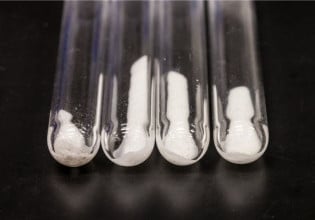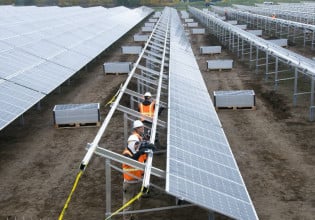Nevada Lithium Mine Moves Ahead After Legal Challenge
A mining project with the United States’ largest known lithium deposit recently commenced construction after a federal judge blocked a legal challenge.
Construction is underway at a massive lithium carbonate mine in Nevada that holds the key to the U.S.’s efforts to shore up domestic electric vehicle battery production. As the largest known lithium deposit in the U.S., Thacker Pass is estimated to contain enough supply for 1 million EVs annually over its 40-year lifetime. General Motors will be a major beneficiary, gaining exclusive access to the first production phase in exchange for a $650 million equity investment.
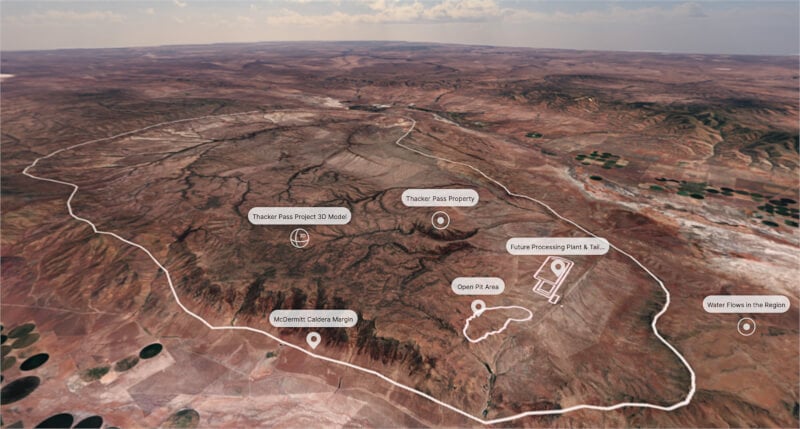
A map of the upcoming Thacker Pass mine in northern Nevada. Image used courtesy of Lithium Americas
After two years of legal challenges, the project commenced this month after a judge in the 9th U.S. Circuit Court of Appeals blocked an emergency request from Nevada conservation groups and tribes that would have prevented imminent construction while the court considered appeals.
The open-pit site is situated near the Oregon border, about a 3.5-hour drive from Reno, and spreads across 17,933 acres—of which about 5,500 will be mined directly. It’s headed by Canadian mining firm Lithium Americas, which estimates Thacker Pass has about 3.7 million tonnes (or 4 million U.S. tons) of lithium carbonate equivalent reserves.
The company plans to start production in the second half of 2026 with an initial capacity of 40,000 metric tonnes of battery-grade lithium carbonate per year. Its second phase of development would scale up to 80,000 metric tonnes annually throughout the mine’s 40-year lifetime. According to Lithium Americas’ feasibility study (dated November 2022, the most recent on record), both phases involve a capital investment of $3.9 billion over seven years.
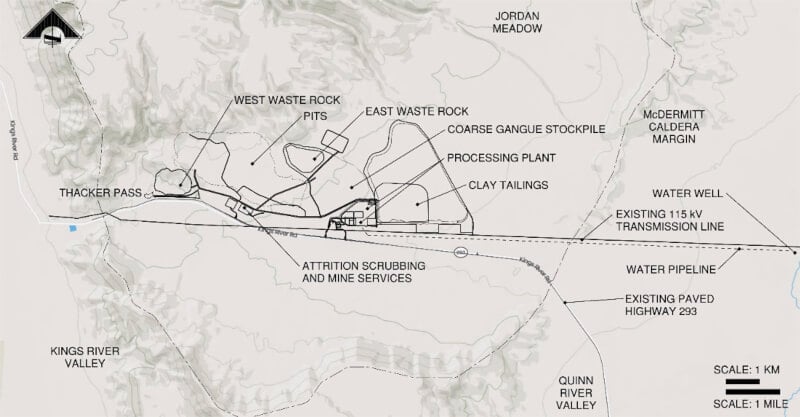
A map of the overall arrangement of the Thacker Pass lithium mining development, as published in Lithium Americas’ feasibility study. Image used courtesy of Lithium Americas
More specifically, phase one will consist of a sulfuric acid plant with a nominal production rate of 3,000 tonnes per day, while phase two will start three years later with a second sulfuric acid plant adding another 3,000 tonnes per day of production.
Late last year, Lithium Americas awarded an engineering, procurement, and construction management contract to Virginia-based Bechtel Corporation to build out phase one.
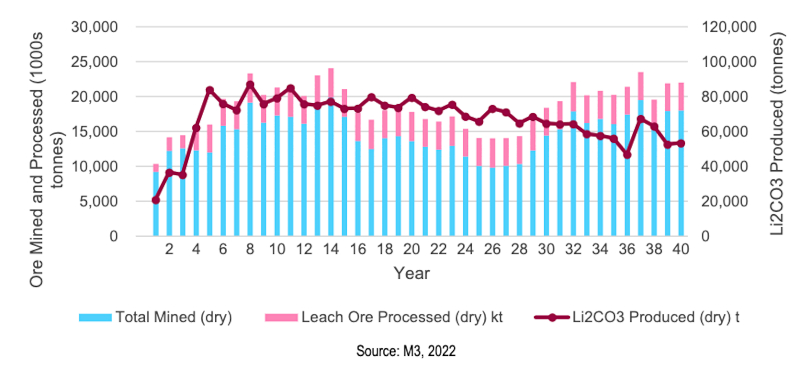
A graph of the total mined, ore processed, and lithium carbonate production for each year of Thacker Pass’s 40-year life, as published in Lithium Americas’ feasibility study (page 267). Image used courtesy of Lithium Americas
Legal Challenges
The project was initially approved by the United States Bureau of Land Management (BLM) in 2021. The Nevada Division of Environmental Protection issued air, water, and mining permits in February 2022.
Lawsuits against the BLM and Lithium Americas ensued, with environmental groups and tribes arguing that the approval process was fast-tracked and ignored concerns about the land’s role as a habitat to the imperiled sage-grouse ground-nesting bird, whose lifecycle depends on sagebrush that would be removed by the development. Past legal filings also cited the site’s cultural significance as the historic homeland of the Fort McDermitt Paiute and Shoshone Tribe, located about 40–50 miles north of Thacker Pass. The tribe later signed a community benefits agreement last year with Lithium Americas that laid out plans for an 8,000-square-foot community center and training/employment opportunities.
An emergency appeal to block construction was filed in February by Idaho-based nonprofits Western Watersheds Project and Wildlands Defense, Nevada-based Great Basin Resource Watch and Basin and Range Watch, alongside local tribes Reno Sparks Indian Colony and Burns Paiute Tribe, which are listed as intervenor-plaintiffs. The appeal came weeks after a judge affirmed the BLM’s 2021 decision to approve the project but ordered the agency to decide whether Lithium Americas’ subsidiary has a right to dump waste rock byproduct on part of the land. Still, construction was allowed to proceed pending BLM’s review of the project’s operation plans.
However, the opposition groups stated that the 9th Circuit set an expedited schedule to hear their appeal in June.
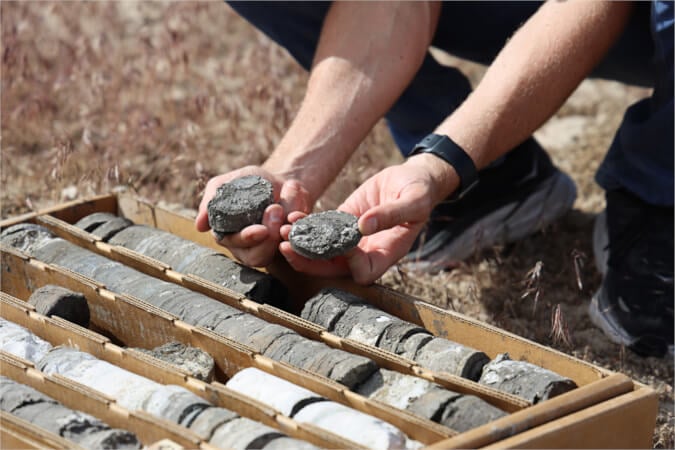
Core lithium samples at the Thacker Pass site. Image used courtesy of Lithium Americas
GM to Use Thacker Pass Lithium for EV Battery Cells
Months before the latest court actions surrounding the project, General Motors announced plans to invest $650 million of equity in Lithium Americas to use Thacker Pass’s lithium carbonate in its Ultium EV battery cells. The Michigan auto giant faces high demand for its growing EV portfolio, including the GMC Hummer electric SUV, the GMC Sierra EV, the Cadillac LYRIQ, and Chevrolet Silverado and Blazer EVs.
According to GM, Lithium Americas estimates that the lithium extracted/processed from the project could support up to 1 million EVs annually.
However, GM’s agreement had some special conditions. The funds for the first tranche of investment would depend on the outcome of the U.S. District Court’s pending Record of Decision ruling. If met, the funds would be freed up, and GM would become a shareholder in Lithium Americas by the end of 2023.
The second tranche is tied to the ongoing separation of Lithium Americas’ U.S. and Argentine businesses into two independent public firms, a move announced last November. Once the first tranche closes, GM will exclusively gain access to phase one production and get the first offer on the second phase.



